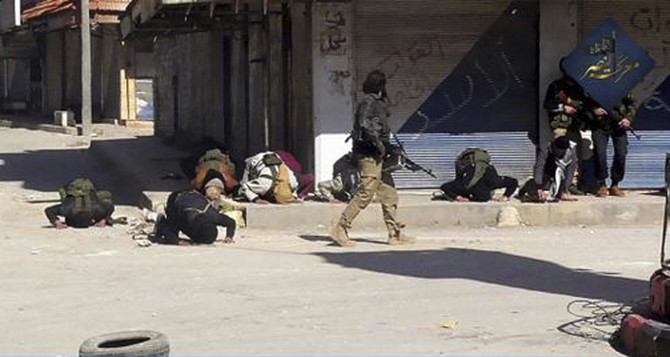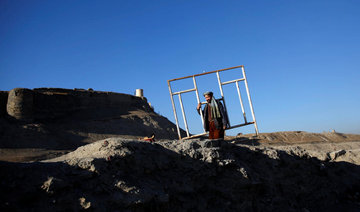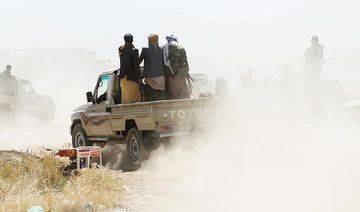BEIRUT: As President Bashar Al-Assad seeks to reassert his authority in Idlib, the only remaining province in Syria where his forces have almost no presence, he may be aided there by deep fractures within Al-Qaeda, the militant group that dominates the region.
A recent wave of detentions and a spate of violence within Al-Qaeda have also raised fears of an all-out war between insurgents in the heavily populated province near Turkey as Assad’s forces make their push.
Assad lost control of Idlib nearly three years ago and he has vowed to recapture it, but that is expected to be a bloody and costly fight. The militant haven is heavily fortified and home to thousands of fighters who transferred there from other parts of the country. It is also where tens of thousands of civilians settled after fleeing fighting in Aleppo, Homs, the suburbs of Damascus and elsewhere.
Tensions inside Idlib have been on the rise for months, reflecting a power struggle between hard-line foreign fighters loyal to Al-Qaeda’s leader, Ayman Al-Zawahri, and its more moderate Syrian members.
The tensions worsened in late November after a wave of detentions by an Al-Qaeda-linked group against more extremist, mostly non-Syrian members. Among those detained were two of Al-Qaeda’s most esteemed leaders and founding members of the extremist group’s branch in Syria, who were set free days later after pressure by factions within the group who threatened to withdraw from the battlefield in protest.
The Nov. 27 raids by the Al-Qaeda-linked Hay’at Tahrir al Sham — Arabic for Levant Liberation Committee, also known as HTS — took many by surprise and angered Al-Zawahri, who accused his top man in Syria of betrayal.
The detentions, ordered by HTS leader Abu Mohammed Al-Golani, were the clearest indication yet of the sharp divisions within the international terror network. They also come as Al-Golani appears to be edging closer to Turkey, which is trying, along with Iran and Russia, to bring an end to the country’s civil war, now in its seventh year.
HTS was until recently on the ascendant in Syria, crushing potential opponents in Idlib as its rival, the Daesh group, faced significant setbacks, losing most of the territory it once held in the country.
Those who were detained included Jordanian citizens Sami Oraidi, Al-Qaeda’s former top religious figure in Syria, and the highly secretive former military commander in southern Syria, Ayad Toubasi, also known as Abu Julaybib Al-Urduni, brother-in-law of the late Al-Qaeda in Iraq leader, Abu Musab Al-Zarqawi.
After their detentions, other Al-Qaeda officials, including a prominent cleric, went to ask Al-Golani why their comrades were detained. But the men ended up being taken into custody themselves.
“The campaign of arrests against our brothers and cadres will not stop us from continuing our struggle against the enemies of God and will open for you a door that you will wish you never opened,” a Syria-based Al-Qaeda commander, Abu Humam Al-Shami, who is opposed to HTS, warned earlier this month.
Days after Al-Shami’s warning, intense clashes broke out between HTS and the Jund Al-Malahem faction that split from it in October and is close to the detained Al-Qaeda officials, leaving at least seven people dead.
“There are widespread concerns of a full-blown confrontation between the two sides,” said an opposition activist in northern Syria who lives in areas controlled by HTS. Speaking by telephone, he asked that his name not be made public for fear of reprisals by the militants.
The activist said that dozens of other members and commanders, including one known as Abu Khadija who used to run Al-Qaeda’s notorious Al-Iqab prison, were also detained.
“It is clear that the jihadist movement in Syria is suffering probably the worst moment of internal fighting since the 2013 schism between ISIS and Jabhat Al-Nusra,” said Jennifer Cafarella of the Washington-based Institute for the Study of War, using an alternate acronym for the Daesh group. Jabhat Al-Nusra or the Nusra Front was the predecessor of HTS before it changed its name.
Oraidi and Toubasi were released after pressure by two of HTS’s most powerful armed wings, which were on the verge of withdrawing from the fight against Assad’s forces if the two were not released, according to Assem Zeidan of the Turkey-based Jabhat Al-Nusra Violations group that traces Al-Qaeda’s atrocities in Syria.
HTS said in a statement that the detainees, whom it did not identify, have “ruined the foundations” of the organization it said was dedicated to “setting up a Sunni entity that gathers all the powers of the people of the Levant to fight the enemy and represent the people of Syria.” It did not say what their offenses were.
The detentions angered Al-Zawahri, who released an audio recording in which he accused HTS and Al-Golani of “betraying the vow of allegiance,” adding that Al-Golani’s decision to break ties with Al-Qaeda last year had weakened the international terror network.
The move, in which Syria’ Al-Qaeda branch, known at the time as the Nusra Front, cut all ties with the international terror network, was seen by many as an attempt to improve its image. Months later, it formed and led a coalition consisting of several militant groups that became known as HTS, and crushed most rival groups in areas it controlled.
Ahmad Hamade, a Syrian army colonel who defected early in the conflict, said that HTS is more tolerated in northern Syria, where Al-Qaeda’s more extremist factions are usually not welcomed. In fact, many HTS fighters were members of the Free Syrian Army, the mainstream rebels fighting to topple Assad, he said.
Cafarella said that what happened over the past year with Al-Qaeda in Syria was that Al-Golani, “a forward-leaning, visionary subordinate, told his skeptical boss (al-Zawahri) to just trust him and let him implement his vision for the good of the organization.”
“The subordinate failed to generate the promised outcome in acceptable time, however. The skeptical boss therefore reclaimed control,” said Cafarella who closely follows extremist groups in the Middle East.
For months, Al-Qaeda’s branch in Syria has been witnessing rivalry between its mostly Syrian, relatively moderate members and the foreign fighters who remain loyal to Al-Zawahri. The tension became more apparent after Turkey started sending troops into areas held by HTS in northern Syria in October, with some HTS members supporting Ankara’s incursion and foreign fighters calling against it.
Asad Kanjo, an opposition activist from Idlib who currently lives in Britain, said that the divisions within Al-Qaeda’s branch in Syria are the result of Al-Golani trying to market himself as a Syrian leader who has no links to the international terror network.
“This is a purely Turkish move. Turkey wants the Syrian branch (HTS) to cut all links with the international organization,” Kanjo said, paving the way for Al-Golani to join the political process.
Hassan Hassan of the Tahrir Institute for Middle East Policy wrote recently that HTS seeks to establish ties with countries like Turkey in an attempt to become part of the solution.
“This will further push away hard-line jihadis and Al-Qaeda loyalists who have to make a decision about their fate in a country that is increasingly divided into spheres of influence of foreign countries,” he wrote.
Al-Qaeda divisions may aid Assad as he eyes Syria’s Idlib
Al-Qaeda divisions may aid Assad as he eyes Syria’s Idlib

Hamas says ‘new’ Israeli conditions delaying agreement on Gaza ceasefire

- “Occupation has set new conditions concerning withdrawal (of troops), the ceasefire, prisoners, and the return of displaced people,” Hamas said
JERUSALEM: Hamas accused Israel on Wednesday of imposing “new conditions” that it said were delaying a ceasefire agreement in the war in Gaza, though it acknowledged negotiations were still ongoing.
Israel has made no public statement about any new conditions in its efforts to secure the release of hostages seized on October 7, 2023.
Indirect talks between Israel and Hamas, mediated by Qatar, Egypt and the United States, have taken place in Doha in recent days, rekindling hope for a truce deal that has proven elusive.
“The ceasefire and prisoner exchange negotiations are continuing in Doha under the mediation of Qatar and Egypt in a serious manner... but the occupation has set new conditions concerning withdrawal (of troops), the ceasefire, prisoners, and the return of displaced people, which has delayed reaching an agreement,” the Palestinian militant group said in a statement.
Hamas did not elaborate on the conditions imposed by Israel.
On Monday, Israeli Prime Minister Benjamin Netanyahu told parliament that there was “some progress” in the talks, and on Tuesday his office said Israeli representatives had returned from Qatar after “significant negotiations.”
Last week, Hamas and two other Palestinian militant groups — Islamic Jihad and the leftist Popular Front for the Liberation of Palestine — said in a rare joint statement that a ceasefire agreement was “closer than ever,” provided Israel did not impose new conditions.
Efforts to strike a truce and hostage release deal have repeatedly failed over key stumbling blocks.
Despite numerous rounds of indirect talks, Israel and Hamas have agreed just one truce, which lasted for a week at the end of 2023.
Negotiations have faced multiple challenges since then, with the primary point of disagreement being the establishment of a lasting ceasefire in Gaza.
Another unresolved issue is the governance of post-war Gaza.
It remains a highly contentious issue, including within the Palestinian leadership.
Israel has said repeatedly that it will not allow Hamas to run the territory ever again.
In an interview with The Wall Street Journal last week, Netanyahu said: “I’m not going to agree to end the war before we remove Hamas.”
He added Israel is “not going to leave them in power in Gaza, 30 miles from Tel Aviv. It’s not going to happen.”
Netanyahu has also repeatedly stated that he does not want to withdraw Israeli troops from the Philadelphi Corridor, a strip of land cleared and controlled by Israel along Gaza’s border with Egypt.
The war in Gaza was sparked by Hamas’s unprecedented October 7 attack on Israel, during which militants seized 251 hostages.
Ninety-six of them are still being held in Gaza, including 34 the army says are dead.
The attack resulted in 1,208 deaths, mostly civilians, according to an AFP tally of Israeli official figures.
Israel’s retaliatory campaign has killed at least 45,361 people in Gaza, a majority of them civilians, according to figures from the Hamas-run territory’s health ministry that the UN considers reliable.
Syria authorities say 1 million captagon pills torched

- Forces pour fuel over and set fire to a cache of cannabis, the painkiller tramadol and around 50 bags of pink captagon pills in the capital’s security compound.
DAMASCUS: Syria’s new authorities torched a large stockpile of drugs on Wednesday, two security officials told AFP, including one million pills of the amphetamine-like stimulant captagon, whose industrial-scale production flourished under ousted president Bashar Assad.
“We found a large quantity of captagon, around one million pills,” said a member of the security forces, who asked to be identified only by his first name, Osama. An AFP journalist saw forces pour fuel over and set fire to a cache of cannabis, the painkiller tramadol and around 50 bags of pink captagon pills in the capital’s security compound.
UK to host Israel-Palestine peace summit

- PM Starmer drawing on experience working on Northern Ireland peace process
- G7 fund to unlock financing for reconciliation projects
LONDON: The UK will host an international summit early next year aimed at bringing long-term peace to Israel and Palestine, The Independent reported.
The event will launch the International Fund for Israeli-Palestinian Peace, which is backed by the Alliance for Middle East Peace, containing more than 160 organizations engaged in peacebuilding between Israelis and Palestinians.
Prime Minister Keir Starmer, a former human rights lawyer who worked on the Northern Ireland peace process, ordered Foreign Secretary David Lammy to begin work on hosting the summit.
The fund being unlocked alongside the summit pools money from G7 countries to build “an environment conducive to peacemaking.” The US opened the fund with a $250 million donation in 2020.
As part of peacebuilding efforts, the fund supports projects “to help build the foundation for peaceful co-existence between Israelis and Palestinians and for a sustainable two-state solution.”
It also supports reconciliation between Arab and Jewish citizens of Israel, as well as the development of the Palestinian private sector in the West Bank and Gaza Strip.
Young Israelis and Palestinians will meet and work together during internships in G7 countries as part of the scheme.
Former Labour Shadow Middle East Minister Wayne David and ex-Conservative Middle East Minister Alistair Burt said the fund is vital in bringing an end to the conflict.
In a joint piece for The Independent, they said: “The prime minister’s pledge reflects growing global momentum to support peacebuilding efforts from the ground up, ensuring that the voices of those who have long worked for equality, security and dignity for all are not only heard, but are actively shaping the societal and political conditions that real conflict resolution will require.
“Starmer’s announcement that the foreign secretary will host an inaugural meeting in London to support peacebuilders is a vital first step … This meeting will help to solidify the UK’s role as a leader in shaping the future of the region.”
The fund is modeled on the International Fund for Ireland, which spurred peacebuilding efforts in the lead-up to the 1999 Good Friday Agreement. Starmer is drawing inspiration from his work in Northern Ireland to shape the scheme.
He served as human rights adviser to the Northern Ireland Policing Board from 2003-2007, monitoring the service’s compliance with human rights law introduced through the Good Friday Agreement.
David and Burt said the UK is “a natural convener” for the new scheme, adding: “That role is needed now more than ever.”
They said: “The British government is in a good position to do this for three reasons: Firstly, the very public reaching out to diplomatic partners, and joint ministerial visits, emphasises the government turning a page on its key relationships.
“Secondly, Britain retains a significant influence in the Middle East, often bridging across those who may have differences with each other. And, thirdly, there is the experience of Northern Ireland.
“Because of his personal and professional engagement with Northern Ireland, Keir Starmer is fully aware of the important role civil society has played in helping to lay the foundations for peace.”
Erdogan announces plans to open Turkish consulate in Aleppo

- Erdogan also issued a stern warning to Kurdish militants in Syria
Turkish President Recep Tayyip Erdogan announced on Wednesday that Turkiye will soon open a consulate in Syria's Aleppo.
Erdogan also issued a stern warning to Kurdish militants in Syria, stating they must either "lay down their weapons or be buried in Syrian lands with their weapons."
The remarks underscore Turkiye's firm stance on combating Kurdish groups it views as a threat to its national security.
Turkish military kills 21 Kurdish militants in northern Syria and Iraq, ministry says

- Turkiye regards the YPG, the leading force within the US-backed Syrian Democratic Forces (SDF), as an extension of the PKK and similarly classifies it as a terrorist group
ANKARA: The Turkish military killed 21 Kurdish militants in northern Syria and Iraq, the defense ministry said on Wednesday.
In a statement, the ministry reported that 20 Kurdistan Workers Party (PKK) and Syrian Kurdish YPG militants, who were preparing to launch an attack, were killed in northern Syria, while one militant was killed in northern Iraq.
“Our operations will continue effectively and resolutely,” the ministry added.
The PKK, designated as a terrorist organization by Turkiye, the European Union, and the United States, began its armed insurgency against the Turkish state in 1984. The conflict has claimed more than 40,000 lives.
Turkiye regards the YPG, the leading force within the US-backed Syrian Democratic Forces (SDF), as an extension of the PKK and similarly classifies it as a terrorist group.
Following the fall of Syrian President Bashar Assad earlier this month, Ankara has repeatedly insisted that the YPG must disband, asserting that the group has no place in Syria’s future.
The operations on Wednesday come amid ongoing hostilities in northeastern Syria between Turkiye-backed Syrian factions and the YPG.
Ankara routinely conducts cross-border airstrikes and military operations targeting the PKK, which maintains bases in the mountainous regions of northern Iraq.


















